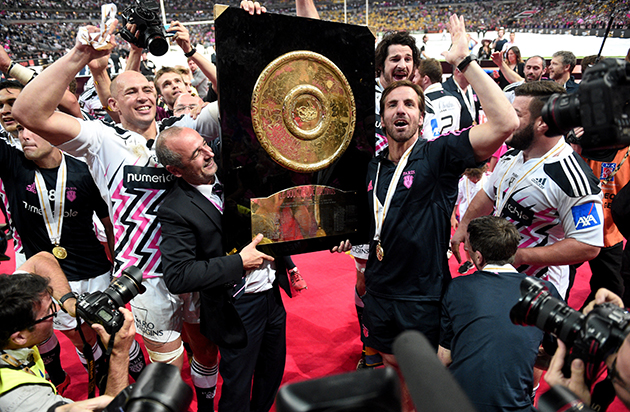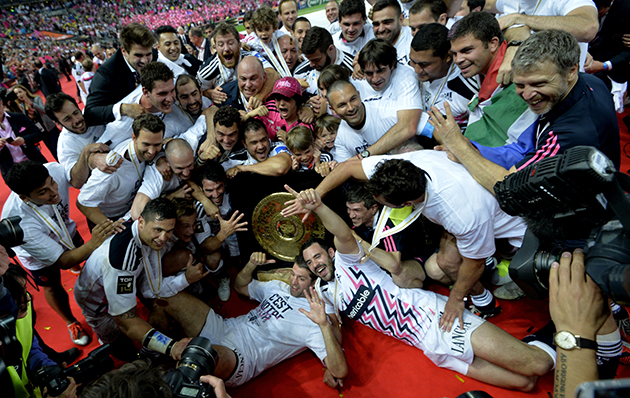As the 2015-16 Top 14 kicks off in France, Rugby World talks to Stade Francais coach Gonzalo Quesada about defending their title
This time last year few people imagined Stade Francais would end up being crowned Top 14 champions for the 2014-15 season. Toulon, Clermont or even Parisian rivals Racing maybe, but not Stade who hadn’t even managed to qualify for the inaugural European Champions Cup the previous season. What no one envisaged was the strength of the Stade Francais spirit, nor the boldness of their game plan, nor the tactical nous of their coach, Gonzalo Quesada. As Stade prepare to start the defence of their title against Pau on Sunday, Rugby World sat down with Quesada to learn more about the secrets of his success…
Rugby World: Did you start last season believing you were title contenders?
Gonzalo Quesada: No. I knew that one day we were going to do something interesting, we had the squad with the quality and the spirit. But I didn’t think it would happen so quickly. I thought it might be the season after.
RW: So the reason for the success?
GQ: When I arrived at Stade I established a framework that set out how we would work and train, the rules we’d respect, squad discipline, and our playing philosophy. But I also created within the framework the space for players to be responsible for their own destinies. In the first season it was all new to them and it wasn’t until start of the second season that I started to see they believed in what we were trying to achieve.
RW: Was there a point last season you started to believe you could win the title?
GQ: We had a spell where we lost three out of four games, including our first home defeat (to Oyonnax on 31 January). I think it was during that period we got stronger. We spent four days in the mountains, going out having nice meals together, laughing, drinking beer. It was a risk because it was the most anti-sport holiday you could imagine. But the squad returned stronger than ever – albeit with a big headache and a couple of extra kilos – and then we put 40 points on Clermont in our next game. That was the first moment that I saw the spirit within the squad and believed we could do something special.

Turning point: Remi Bonfils attacks during Stade’s 40-26 win over Clermont in March. Photo: Getty Images
RW: Why did you accept the Stade job in 2013 given their recent financial problems?
GQ: Yes, when I signed on at this club it was quite unstable with a lot of changes in the structures, the players, the coaches. But I know this club. I played here and kept in contact with them and I like its identity. When they offered me the position some of my friends said, ‘Don’t go there, you’re too young, your career is going really well and you’ll blow it there’. But I knew it wasn’t that suicidal because I know the spirit of the club.
RW: Describe your relationship with club president Thomas Savare.
GQ: From the first day Thomas understood that I arrived willing to work hard and do my best to get Stade back to where it had been. I won his trust and in return he gives me freedom. I talk to Thomas once or twice a week, or maybe not for a fortnight. I know that I’m very lucky because I have contacts at other clubs who tell me some presidents are always there, wanting to know what’s going on, putting an extra bit of pressure on the staff. I feel I don’t have that extra pressure, that Thomas believes in what we are doing and he let me do things my way.
RW: Stade haven’t recruited as extravagantly as their rivals in recent years. Why not?
GQ: When we bring in big names it’s important we believe they can fit into our framework. Our president has been strongly criticised by some people who said he was not ambitious enough with his recruitment compared to other clubs. But we are very careful and bring in guys only when we’re sure they are going to add to the squad. So that’s why if you compare us to the likes of Toulon, Racing and Montpellier we recruit fewer players because we recruit carefully so we don’t create problems inside the squad.
RW: Are there any young academy players we should keep an eye on?
GQ: When I arrived here our academy was not our strength. Last year was better, and this year it will be very strong with the likes of Mathieu de Giovanni and Sekou Macalou. Increasingly I prefer to push our kids up (from the academy) rather than just grab any high-profile player who comes along.
RW: Were you approached for the France job earlier this year?
GQ: Before the official application process was launched I had a couple of phone calls from the federation sounding me out, seeing if I could be interested in applying. That was it. Then I heard there was a shortlist and I was on it but I don’t know how real that was – it may just have been rumours. But anyway I re-signed with Stade in December and even if I have a clause in my contract releasing me if I’m called by a national team, I am still in the middle of my project here.

Top trio: Gonzalo Quesada (right) celebrates with Sergio Parisse and Thomas Savare. Photo: Getty Images
RW: How impressed are you with what Simon Mannix has achieved in his first season in charge of Pau?
GQ: I know Pau well because I played there and he’s done well to come in, keep the good stuff that was there but also bring in a new style and get everyone behind him in the process. It’s a big achievement because it’s always tough to come into a new club, particularly if you’re a foreigner.
RW: Talking of tough, Parisians have a reputation for being hard to please. How have you found the Stade fans since your arrival?
GQ: It is tough because Parisians have so many things to do outside rugby. In Toulon or Perpignan rugby is the big entertainment. In Paris you are in competition with other sports, theatres, operas, music concerts and so on. I think we’ve created a spirit within the club that the fans can feel and which they respond to and which brings in new fans. Also our style is attractive and nice to watch. It would be hard to convince Parisians to come and watch us if we played slow, conservative rugby.
RW: How much greater is the pressure now you’re champs?
GQ: We’re aware it’s a lot more now because everyone has a special motivation to beat us. We did some work on that during our pre-season training camp – identifying the dangers we face from the outside and from the inside. By that I mean how being champions might affect our behaviour and our attitude. It threw up some interesting results and I think it will help us during the season. But in a way we’re lucky that the start of the season is so disrupted by the World Cup. I’m missing 13 players so right now we’re more focused on trying to get through this month with so many key players missing rather than worrying about being champions.
For the latest Rugby World subscription offers, click here. Find out how to download the magazine here.






